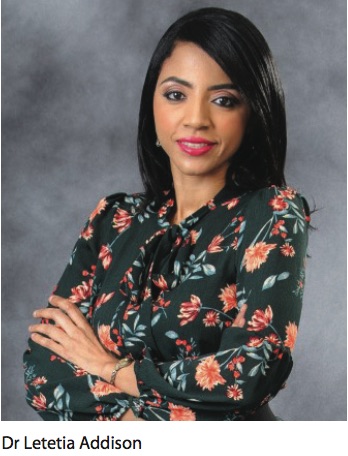
Dr Letetia Addison was always a math kid. “Since I was young, I always loved numbers. I always loved calculations,” said Dr Addison, talking about the passion that would take her through a double major undergrad degree in Mathematics, an MPhil in Statistics, and a PhD in Mathematics. “It’s something that we use every day, as part of our everyday lives.”
Part of the appeal for her is the practical aspects of numbers, and how they can teach us more about ourselves and the world around us – which is what led her to data science.
STEM fields like data science are often either male-dominated spaces – or are at least perceived that way. But Women in Data Science (WiDS), which started as a one-day technical conference at Stanford University in 2015, is one of the movements to create a more encouraging space for women and girls to participate in data science initiatives.
“For a long time, there has been consistent advocacy, hard work, and demonstrated capacity by women in STEM to show their contributions, their influence, and their capacity for decision-making. The work continues,” said Dr Sue-Ann Barratt, Head of the Institute for Gender and Development Studies (IGDS) at UWI St Augustine.
This year, Dr Addison is T&T’s Ambassador to the Women in Data Science Worldwide Conference. She is currently a Project Officer and Statistical Consultant at the University Office of Planning at The UWI, and has been hard at work with the organising team creating a wide range of activities to ignite the interest of the next generation of young women in STEM.
“I’m really happy to be a part of the Women in Data Science Initiatives because I think it gives women in STEM such as myself the opportunity to share that passion, to motivate others, and to allow them to feel like this is a safe space to learn and grow and communicate,” said Dr Addison.
The Trinidad and Tobago chapter of WiDS (which can be found at https://widstt.org) is hosting independent local events as part of the annual worldwide conference, including the 6th Datathon Challenge.
The prelude to the conference is a series of workshops hosted by the WiDS T&T Organising Committee to help science enthusiasts learn more about the Datathon challenge and the science in general, while spotlighting the female perspective in data science-related fields. Here, participants are given a challenge with a specific dataset that they must use to make predictions about the data.
Dr Addison and her team are hosting the workshops, webinars and panel discussions to help arm potential participants with all the resources they would need to take on the challenge. Even absolute beginners can get involved, as the activities are open to anyone with an interest in numbers and how they can change our lives.
Learning how to work with data is a skill with very meaningful practical applications. One of Dr Addison’s WiDS projects in 2022 involved learning more about how we consume energy, which is particularly important as we confront issues like climate change.
“I was thrilled to be a participant last year where I was able to work on a predictive dataset on a social impact challenge, predicting energy consumption in buildings. It was a really hands-on experience for me, to be able to work with data; to take some of the knowledge of statistics and programming skills, and apply that to a real-world dataset and make predictions,” she said.
In a follow-up project, the team used machine-learning to make flood predictions. “We were able to develop a prototype to create a tool that would actually allow various OECS countries to predict the occurrence of a flood or natural disaster event based on variables like temperature and precipitation.”
The beauty of this type of research is how data can paint a picture of what is going on at a scale that we don’t often get to see.
“That’s why I was so glad to be a part of the WiDS initiative,” said Dr Addison, “because that’s where you can have a base to understand how to interact with these statistical models, and use them to tell a story and to give us the insights to enhance our lives.”
As the field encourages diversity and enables women and girls to be a part of these types of projects, we are collectively widening our scope of what sort of information we can learn, and how we can put it into practice.
“In terms of research and interventions, there is a thrust to understand how we can use the knowledge of science and technologies to address sustainably intersecting injustices – how social justice connects with gender injustice, connects with climate injustice,” said Dr Barratt.
With greater inclusivity comes a greater understanding of the diverse communities living in the world.
As WiDS 2023 hits the ground running, workshops and activities are continuing throughout February and into March, coinciding with International Women’s Day on March 8. All events are free and the team has a dedicated YouTube page, https://www.youtube.com/@widstt, to share tools and resources for those eager to learn more about the numerical world of data.